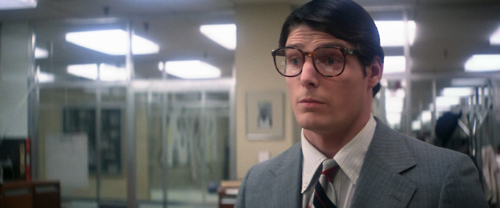
Cinema de Super Part 1b; Read the review here
Our journey through cinematic super-hero-dom begins appropriately with Superman (1978). Superman the character kicked off super-hero comics and the success of Superman the movie proved that comic book films could be a viable investment, although this wasn’t acted on until a decade after the fact. Being so far removed from our other entries means that it’s distinct, but still familiar. It’s a relic of a different era, one where red curtains unfolded both in front of the screen and in it. The tradition of Cecil B. Demille stepping out to set the stage is in this case replaced with a kid reading an issue of Action Comics. Superman had the unique task of elevating comic books to a serious and convincing cinematic level – for the first time. Batman (1989) and its followers didn’t have to do this. This task rests solely on the shoulders of Superman and, by extension, director Richard Donner. The film itself isn’t just a relic, but Donner makes it about them as well. The advertising campaign for Superman boasted that “You will believe a man can fly,” and indeed Donner tries his hardest to convince you of this. He contrasts the wholesome 1940s character against the far more chaotic 1970s. He doesn’t force these two worlds into a confrontation, but rather merely acknowledges the campiness of the hero in order to make you accept him as “reality.” Seeing Superman wave to an afro-touting disco dude and stop down-to-earth crime like tube-sock-wearing bank robbers and a high-rise-scaling cat burglar is entertaining, sure, but what really sells the film as something more than just “the funny pages” is the man in the bright red, blue, and yellow suit himself: Christopher Reeve.
I grew up with the Reeve Superman movies. I used to run around in a Superman cape at my Grandma’s house, with Superman IV: Quest for Peace playing in the background for the 700th time. When the Hollywood Video down the street from us closed, the sole thing I bought from their soon-to-be-discarded stock was an old VHS of Superman. While Tim Daly is iconic and Brandon Routh looks the part, Christopher Reeve is my Superman. His grin as he swoops through the air to the sounds of John Williams score is Superman to me. That’s the character in a nutshell.
What Reeve brings to the role, and what makes it work, is ultimately the same aspects that make the film itself work. There’s this undeniable charm and instinctual genuinity that emanates from him at all times. Chuckles are elicited as he bumbles through the Daily Planet’s office, but we can see the layers of Kent’s facade. He may be over-playing the nice guy, but he genuinely wants to be one as well, which makes the constant pushback against him all the more heartbreaking. When he dons his cape a lot of the personality and humanity of Clark Kent is lost, but with a smile Reeve makes you understand that Superman isn’t supposed to be human, he’s an icon.
The film reflects these qualities as well, with Donner pouring charisma and honesty into each part of the film. Donner knows it’s campy material, but instead of playing up that camp like the 60s Batman series, he presents it to you straight, merely asking you to play along. The film deserves this investment, and Donner tries his hardest to reward you. The beginning section on Krypton could have been played off as cheesy sci-fi, thrown in for five minutes before moving on to “the good stuff.” However, Donner holds you in this world, subtly implying its politics, technology, and society. It’s taken seriously, and this validity is also given to the very situation that Jor-El and Lara are in: sending their son to another world to avoid his death. The two bounce points off each other: Jor-El insisting that at least he will survive, Lara lamenting his inevitable loneliness. This somber moment is powerful and gives their death, along with the planet’s destruction, the weight it deserves.
It’s easy for writers to get carried away with how alien Superman is, but at the core of his origin is an anchor of humanity: his childhood in Smallville. The rather light-hearted and seemingly pointless scenes of Clark’s daily life weigh heavily on the rest of the film for they are our reminder that Clark Kent is Superman, not the other way around. The alien world of endless ice and snow is a far cry from Kansas, but the endless fields of crops serve the same purpose. It isolates Clark, protects him, and makes his relationships with his family and friends all the more important. These relationships are tested and ultimately shattered when Jonathan Kent dies, but not before passing on some wisdom that alludes to just how great a father he was. In grief we transition from the isolation of Smallville to the literal isolation of the Fortress of Solitude. Here Clark goes through that essential transition to adulthood, with both Jonathan and Jor-El as his guiding voices.
This isolation is broken, and not quietly, as we finally swoop into Metropolis, bombarded by the crowds of people, the honking cars, and the fast pace of not just the city, but the people therein. We’re re-introduced to Clark as well as the rest of the iconic cast and for me this ten minutes is a rare treat to watch or, more precisely, listen to. Donner steps back and lets the actors and the script take over, as the clear and concise writing gets across to us who the characters are and what they’re like with all the ease of a comic, but without the cheesy over-explanatory dialogue. It’s the kind of character writing that deals in archetypes, not cliches or stereotypes. A rare thing indeed.
An hour in, the slow burn is rewarded, for the introduction of Superman is careful, intentional, and marvelous. For Superman, the things he does during this debut night aren’t particularly spectacular when you consider the source material. So Donner focuses on the everyday people instead, emphasizing their wonder and amazement. These scenes breach into corniness occasionally, but the disbelief and stunned attitude these characters have reflects how most of us would react, albeit nowadays with a phone in our hands.
The film must have an actual conflict though, and thus Lex Luthor kicks his real estate scam into action. It’s in the interactions of him and his two goons that we feel the oppressions of campiness. Gene Hackman does a brilliant Luthor, yes, but he’s weighed down by the scripts emphasis on him berating the mistakes of the buffoon Otis. Going back to Donner’s compromises, this is the big one. These were not the days where people would just accept mutants fighting each other or a man in an iron suit fighting aliens, after all Star Wars had come out just a year earlier. So Donner makes Superman comedic, and more obviously so than the witty dialogue that persists through the rest of the film. This does succeed at making the film more accessible, especially for kids, but it leaves the last act lacking the weight the rest of the film has.
In fact the whole climax lacks punch until Lois Lane’s car gets trapped in an avalanche. Superman finds her dead and Reeve’s performance during this scene is interesting. This is an important lesson for Clark to learn- that he can’t save everyone, even those he loves. His rage at himself and at the world comes across clearly and legitimately, but his scream of anger does seem over the top.
The ending is infamously the largest logical fallacy in the plot that Superman has. It’s, of course, impossible to turn back time by changing the earth’s rotation. Regardless of the visual representation, Superman has gone back through time in the comics and considering this film came out just 10 short years after his adventures with Streaky the Super-Cat, I’d say it could be a lot worse. In fact this ending is thematically interesting. Superman is in mid-flight when the voices of his fathers pop into his head, Jor-El repeating over and over that it is forbidden and Pa Kent affirming that Clark is here for a greater purpose. Clark pushes on, turns back time, and saves Lois. This is a selfish act, the only one. The one moment where Clark uses his powers for himself, not for others. This isn’t simply courting Lois Lane, this is actually changing the world. Because he can. And he wants to. Just this once. It’s one final confirmation that Superman may be from another planet, but he is human. He can be blinded by love. He can disobey his parents. Just like the rest of us.
 For me, 45 years removed, Superman is still one of the best super-hero movies ever made. Perhaps it’s the fact that standards hadn’t been “set” for adapting this material, allowing for the kind of experimentation that proliferated the 1970s and created several great films like this one. Donner takes the source material seriously and presents it earnestly. He seeks not to overwhelm you with spectacle, but to convince you to believe in what small spectacle there is and, paramountly, believe in its hero. Any six year old can walk out of a super-hero film in love with said hero, but it takes a real special film to do the same for adults. Perhaps it’s because Donner and Reeve don’t emphasize that Superman is a hero, rather they let you fill in the blanks as he earns that title. Perhaps it’s because of the love of the audience that emits not just from Donner’s film, but from Reeve’s Superman. Whatever the reason, you can be sure that while Superman may say goodbye with a salute and a wink, he’ll be back whenever we need him most.
For me, 45 years removed, Superman is still one of the best super-hero movies ever made. Perhaps it’s the fact that standards hadn’t been “set” for adapting this material, allowing for the kind of experimentation that proliferated the 1970s and created several great films like this one. Donner takes the source material seriously and presents it earnestly. He seeks not to overwhelm you with spectacle, but to convince you to believe in what small spectacle there is and, paramountly, believe in its hero. Any six year old can walk out of a super-hero film in love with said hero, but it takes a real special film to do the same for adults. Perhaps it’s because Donner and Reeve don’t emphasize that Superman is a hero, rather they let you fill in the blanks as he earns that title. Perhaps it’s because of the love of the audience that emits not just from Donner’s film, but from Reeve’s Superman. Whatever the reason, you can be sure that while Superman may say goodbye with a salute and a wink, he’ll be back whenever we need him most.










